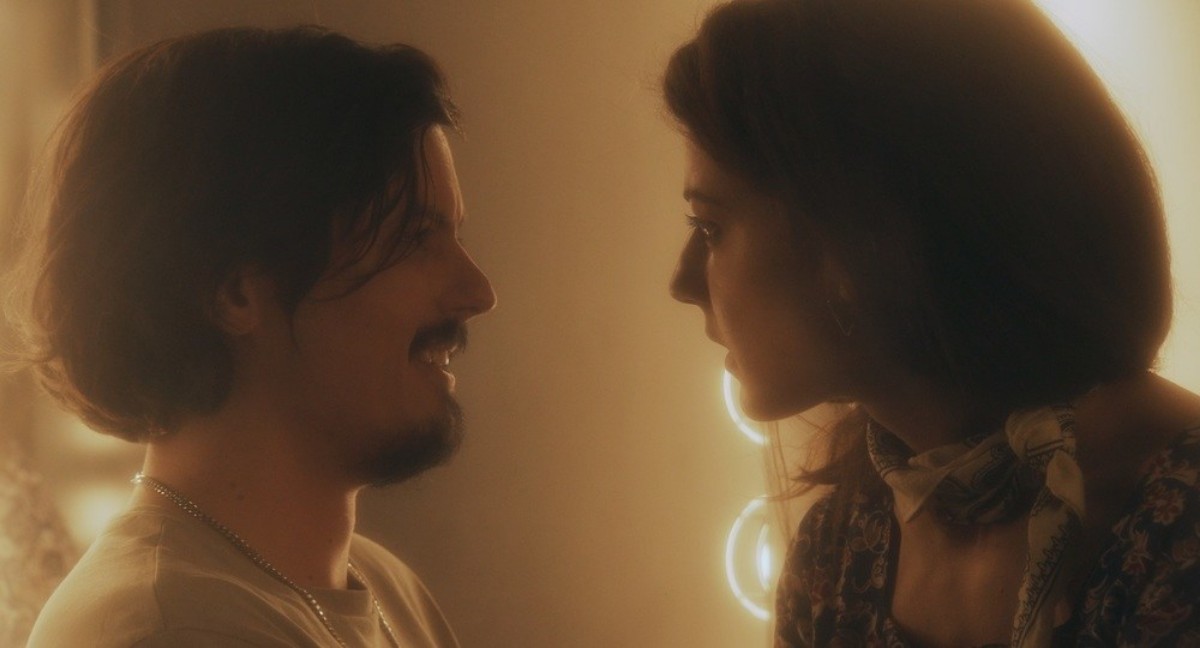The romantic version of a Mexican standoff, except everyone has their heart rather than a gun pointed at someone else, “The Great Pretender” is a film about personal mythmaking and the art of self-absorption. Bouncing between narratives and time periods, writer/director Nathan Silver offers up a raw and honest view of something everyone has experienced, yet few have seen. It’s kind of like looking at your pancreas for the first time: a person might know it’s always been there, enjoying the work it does each day, but unless someone pulls it out for inspection, few know what it actually looks like.
Title cards introduce each of the film’s leads, starting with Mona (Maëlle Poesy-Guichard), who is directing a play about her relationship with ex-boyfriend Nick (Linas Phillips). As a form of emotional exorcism, Mona is sleeping with the actor playing Nick in her play, Chris (Keith Poulson), who has fallen hard for Mona. The feeling isn’t mutual, however, and while Mona seems to enjoy the cathartic release of screwing the guy playing the guy who screwed her, it’s all pretty fleeting.
Chris is all-in on Mona, however, and despite her obvious signaling that it is little more than sexual tennis, Chris is head-over-heels nonetheless. This complicates his relationship with co-star, Thérèse (Esther Garrel), who is crazy for Chris, yet gets the same brush-off Chris gets from Mona when they finally hook up. Complicating matters further is Thérèse’s maneuver to seduce the elusive Nick in a twisted end-around that she thinks will make her more like Mona, and thus become the person Chris is after.
More than just a love-triangle yarn (a love-rhombus, perhaps?), “The Great Pretender” is interested in the ways people see themselves as actors in their own personal productions. Silver uses time jumps within his narrow narrative framework to revisit certain moments several times after gaining new perspectives so that he can pull apart the different ways people frame their own realities. This is, of course, somewhat meta within the film, for everything revolves around Mona’s stage production, which is itself an interpretation of a relationship as viewed through the lens of just one participant.
“The Great Pretender” is thus a sort of romantic “Inception,” with layers of meet-cute and longing stacked over flashbacks of pain, regret, delusion, and missed signals. Realities start parallel to each other, only to fold into adjacent ones in ways that show them to be both similar yet worlds apart. For example, Chris is rebuffed the morning after a tryst with Mona when he attempts to make breakfast, much in the same way that Thérèse is snubbed by Chris when she makes him pancakes after a fling. They’re all driving in the same direction, yet with different destinations in mind, and with no foresight that anyone else is doing what they are. All of these people are stuck inside their own narrative of what’s going on, never stepping outside of themselves to look at their situation critically.
Silver’s direction walks in lock-step with the script and the thematic material at play in “The Great Pretender,” using lots of tight close-ups to keep inside the heads of these characters. This is a story about the ways that people cloister themselves into little worlds of one, and despite their seeming concern for other people vis-à-vis
a relationship, how they fail their partners by abandoning any concept of an “other.”
When Chris says, “I can only come during sex if I know I’m going to get my heart broken,” one gets the sense that he isn’t joking, and that he’s gotten so inside of his own head that his concept of love only functions if he’s cast in the role of victim. This assumes he goes into relationships knowing how they will end, and that he’s defined romantic aspirations around his needs, rather than those of someone else. This fundamental disconnect between what it means to be in a partnership versus Chris’ understanding of his own intimacy wish fulfillment says it all.
Relationships involve two people, and as long as Chris, Mona, Thérèse, and Nick live exclusively inside their own heads, they’ll only ever be half-happy, at best. Chris should be concerned with how his partner (not him) will come, just as Mona should be directing her actors instead of screwing one of them. Silver has done something really special with all of this, bringing the stories of these four people together in a sort of relationship mélange that speaks to the ways people can’t help but miss the forest for the trees.
Much like the close-ups Silver is fond of, it’s hard to see a person when you’ve come up so close to them that their face is all that can be taken in. At a tidy 70 minutes, “The Great Pretender” is a magnificent, tight exploration of romance and what it means to walk that path wearing blinders. Most people have done this at one point or another, and Silver’s triumph is that he’s crafted a film that puts his audience both inside of this, but also at a distance where it can be appreciated. [A]





